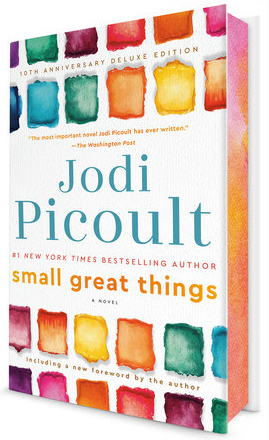
#1 NEW YORK TIMES BESTSELLER • Now in a stunning tenth-anniversary edition, “the most important novel Jodi Picoult has ever written” (The Washington Post) tackles race, privilege, prejudice, justice, and compassion—and doesn“t offer easy answers. This deluxe hardcover edition includes a brand-new introduction from the author and cover art in addition to gorgeous sprayed edges and a stamped case.
The paperback edition includes a reading group guide and a Q&A with author Celeste Ng.
In her highly-anticipated 2016 novel, SMALL GREAT THINGS, Jodi tackles the profoundly challenging yet essential concerns of our time: prejudice, race, and justice.
SMALL GREAT THINGS is the most important novel Jodi Picoult has ever written. Frank, uncomfortably introspective and right on the day’s headlines, it will challenge her readers...The difficult self awareness is what sustains this book...forcing engaged readers to meditate on their own beliefs and actions along with these characters....It's also exciting to have a high-profile writer like Picoult take an earnest risk to expand our cultural conversation about race and prejudice.
#1 SMALL GREAT THINGS debuts as #1 NYT bestseller!
Ruth Jefferson is a labor and delivery nurse at a Connecticut hospital with more than twenty years’ experience. During her shift, Ruth begins a routine checkup on a newborn, only to be told a few minutes later that she’s been reassigned to another patient. The parents are white supremacists and don’t want Ruth, who is African American, to touch their child. The hospital complies with their request, but the next day, the baby goes into cardiac distress while Ruth is alone in the nursery. Does she obey orders or does she intervene?
Ruth hesitates before performing CPR and, as a result, is charged with a serious crime. Kennedy McQuarrie, a white public defender, takes her case but gives unexpected advice: Kennedy insists that mentioning race in the courtroom is not a winning strategy. Conflicted by Kennedy’s counsel, Ruth tries to keep life as normal as possible for her family—especially her teenage son—as the case becomes a media sensation. As the trial moves forward, Ruth and Kennedy must gain each other’s trust, and come to see that what they’ve been taught their whole lives about others—and themselves—might be wrong.
With incredible empathy, intelligence, and candor, Jodi Picoult tackles race, privilege, prejudice, justice, and compassion—and doesn’t offer easy answers. Small Great Things is a remarkable achievement from a writer at the top of her game.…more
SMALL GREAT THINGS chosen for NNSTOY Social Justice Booklist!
SMALL GREAT THINGS was chosen for the 2017 NNSTOY social justice booklist for high school - adult readers. The National Teachers of the Year booklist is a resource for educators, parents, community members and policy makers interested in reaching young people on issues of social justice.
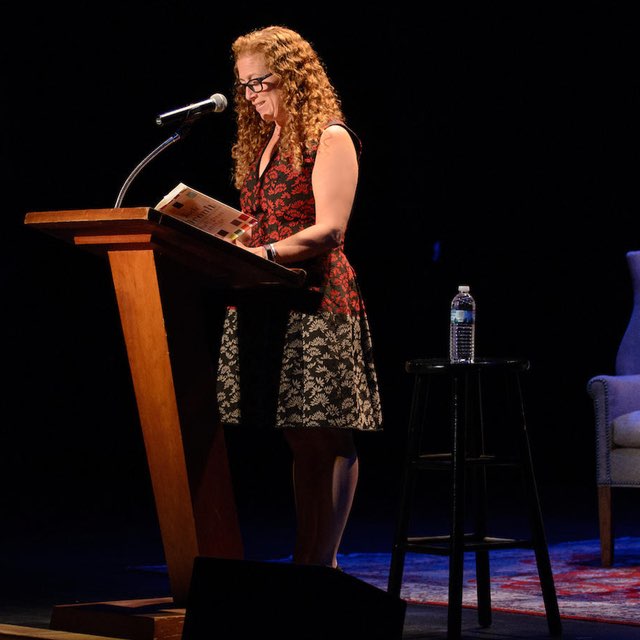
New Hampshire Public Radio and The Music Hall present Writers on a New England Stage with Jodi Picoult recorded live at The Music Hall in Portsmouth, NH - October 26, 2016. Listen to NHPR's WORD OF MOUTH host Virginia Prescott interview (50:30) Jodi about Small Great Things and the author’s perspective on racism, white privilege and the inherited inequities of America’s past and present.
“Jodi Picoult has dealt with weighty issues such as teenagers with leukemia in My Sister's Keeper and child sexual abuse in Perfect Match. Now, in her latest novel, she's covering another pressing topic: racism in the United States”.
Read the …full article

Jodi talks about what inspired her to write Small Great Things with NPR Weekend Edition Saturday host Scott Simon - October 8, 2016
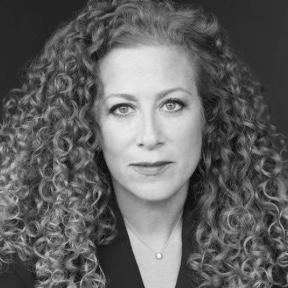
Once you've read Small Great Things, I'd love for you to share with others what the reading experience was like for you.
Please visit the Small Great Things page at Penguin Random House to download a Reader’s Guide, Teacher’s Guide, and discussion questions to share with your book club, readers or students.
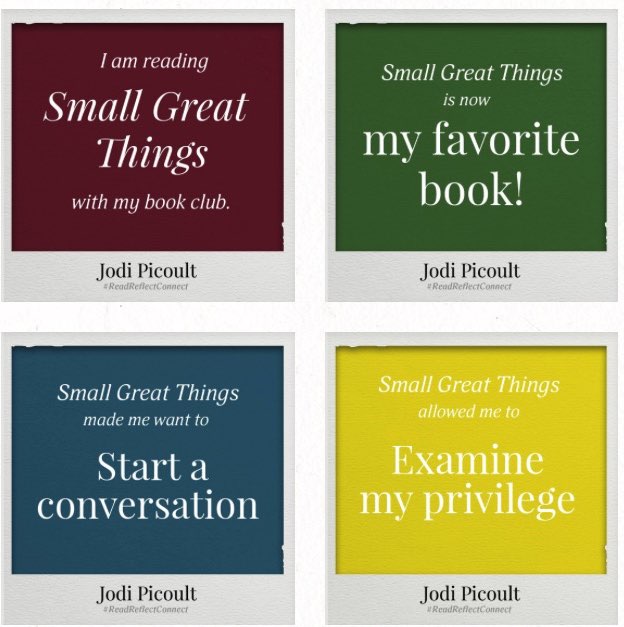
It’s Kennedy’s journey of coming to terms with her own racist relatives and white privilege, as she realizes, for the first time, the pervasiveness of American racism, that is the real story here…
—Kirkus Reviews
The publisher: Ballantine Books, publication date: October 11, 2016
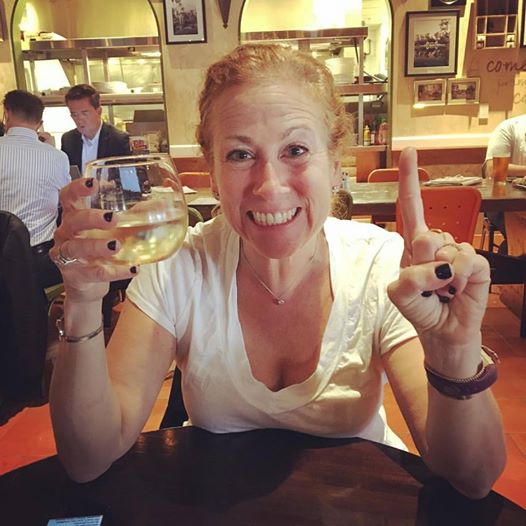
This is the deliriously happy face of a #1 NYT bestseller!!
Stream SMALL GREAT THINGS by Jodi Picoult --Author's Note by PRH Audio from desktop or your mobile device on SOUNDCLOUD
About four years into my writing career, I wanted to write a book about racism in the US. I was drawn by a real-life event in NYC, when a Black undercover police officer was shot in the back, multiple times, by white colleagues – in spite of the fact that the undercover cop had been wearing what was called “the color of the day” – a wristband meant to allow officers to identify those who were in hiding. I started the novel, foundered, and quit. I couldn’t do justice to the topic, somehow. I didn’t know what it was like to grow up Black in this country, and I was having trouble creating a fictional character that rang true.
Flash forward twenty years. Once again, I desperately wanted to write about racism. I was uncomfortably aware that when white authors talked about racism in fiction, it was usually historical. And again, what right did I have to write about an experience I had not lived? Then again, if I’d only written what I knew, my career would have been short and boring. I grew up white and class-privileged. For years I had done my homework and my research, using extensive personal interviews to channel the voices of people I was not: men, teenagers, suicidal people, abused wives, rape victims. What led me to write those stories was my outrage and my desire to give those narratives air time, so that those who hadn’t experienced them became more aware. Why was writing about a person of color any different?
Because race is different. Racism is different. It’s fraught, and it’s hard to discuss, and so as a result we often don’t.
Then I read a news story about an African-American nurse in Flint, MI. She had worked in labor and delivery for over twenty years, and then one day a baby’s dad asked to see her supervisor. He requested that this nurse, and those who look like her, not touch his infant. He turned out to be a White Supremacist. The supervisor put the patient request in the file, and a bunch of African-American personnel sued for discrimination and won. But it got me thinking, and I began to weave a story.
I knew that I wanted to write from the point of view of a Black nurse, a skinhead father, and a public defender – a woman who, like me, and like many of my readers, was a well-intentioned white lady who would never consider herself to be a racist. Suddenly I knew that I could, and would, finish this novel. Unlike my first aborted foray, I wasn’t writing it to tell people of color what their own lives were like. I was writing to my own community – white people – who can very easily point to a Neo-Nazi skinhead and say he’s a racist…but who can’t recognize racism in themselves.
Truth be told, I might as well have been describing myself not so long ago. I am often told by readers how much they’ve learned from my books – but when I write a novel, I learn a lot as well. This time, though, I was learning about myself. I was exploring my past, my upbringing, my biases, and I was discovering that I was not as blameless and progressive as I had imagined.
Most of us think the word “racism” is synonymous with the word “prejudice.” But racism is more than just discrimination based on skin color. It’s also about who has institutional power. Just as racism creates disadvantages for people of color that make success harder to achieve, it also gives advantages to white people that make success easier to achieve. It’s hard to see those advantages, much less own up to them. And that, I realized, was why I had to write this book. When it comes to social justice, the role of the white ally is not to be a savior or a fixer. Instead, the role of the ally is to find other white people and to talk to make them see that many of the benefits they’ve enjoyed in life are a direct result of the fact that someone else did not have the same benefits.
I began my research by sitting down with women of color. Although I knew that peppering people of color with questions is not the best way to educate oneself, I hoped to invite these women into a process, and in return they gave me a gift: they shared their experiences about what it really feels like to be Black. I remain so grateful to these women – not just for tolerating my ignorance, but for being willing to teach me. Then I had the pleasure of talking to Beverly Daniel Tatum, former president of Spelman College and a renowned racial educator. I read books by Dr. Tatum, Debby Irving, Michelle Alexander, and David Shipler. I enrolled in a social justice workshop called Undoing Racism, and left in tears every night, as I began to peel back the veneer of who I thought I was from who I truly am.
Then I met with two former skinheads, to develop a vocabulary of hate for my White Supremacist character. My daughter Sammy was the one who found Tim Zaal – a former skinhead who had Skyped with her class in high school. Years ago, Tim beat up and left a gay man for dead. After getting out of the Movement, he started to work at the Simon Weisenthal Center talking about hate crimes and realized one day that the man he had left for dead worked there too. There were apologies and forgiveness, and now, they are friends who talk about their unique experience to groups every week. He also is happily married, now, to a Jewish woman. Frankie Meeink, another former skinhead, works with the Anti-Defamation League. After recruiting for hate crews in Philly, he now runs Harmony through Hockey – a program to promote racial diversity among kids.
These men taught me that the White Power groups believe in the separation of the races and think they are soldiers in a racial holy war. They explained how recruiters for hate groups would target kids who are bullied, marginalized, or who come from abusive homes. They’d distribute anti-white flyers into a white neighborhood and see who responded by saying that the whites were under attack. Then they’d approach those folks and say You’re not alone. The point was to redirect the recruit’s rage into racism. Violence became a release, a mandate. They also taught me that now, most skinhead groups are not crews seeking out violence, but rather individuals who are networking underground. Nowadays, White Supremacists dress like ordinary folks. They blend in, which is a whole different kind of terror.
When it came time to title this book, I found myself struggling again. Many of you who are long-time fans of mine know this was not the original name of the novel. SMALL GREAT THINGS is a reference to a quote often attributed to Reverend Dr. Martin Luther King, Jr.: “If I cannot do great things, I can do small things that are great.” But as a white woman, did I have the right to paraphrase these sentiments? Many in the African-American community are sensitive to white people using Martin Luther King, Jr.’s words to reflect their own experience, and with good reason. However, I also knew that both Ruth and Kennedy have moments in this novel where they do a small thing that has great and lasting repercussions for others. Plus, for many whites who are just beginning to travel the path of racial self-awareness, Dr. King’s words are often the first step of the journey. His eloquence about a subject most of us feel inadequate putting into words is inspiring and humbling. Moreover, although individual changes cannot completely eradicate racism -- there are systems and institutions that need to be overhauled as well – it is through small acts that racism is both perpetuated and partially dismantled. For all of these reasons – and because I hope it will encourage people to learn more about Dr. King -- I chose this title.
Of all my novels, this book will stand out for me because of the sea change it inspired in the way I think about myself, and because it made me aware of the distance I have yet to go when it comes to racial awareness. In America, we like to think that the reason we have had success is because we worked hard or we were smart. Admitting that racism has played a part in our success means admitting that the American dream isn’t quite so accessible to all. A social justice educator named Peggy McIntosh has pointed out some of these advantages: having access to jobs and housing, for example. Walking into a random hair salon and finding someone who can cut your hair. Buying dolls, toys, and children’s books that feature people of your race. Getting a promotion without someone suspecting that it was due to your skin color. Asking to speak to someone in charge, and being directed to someone of your race.
When I was researching this book I asked white mothers how often they talked about racism with their children. Some said occasionally; some admitted they never discussed it. When I asked the same question of Black mothers, they all said, Every day.
I’ve come to see that ignorance is a privilege, too.
So what have I learned that is helpful? Well, if you are white, like I am, you can’t get rid of the privilege you have, but you can use it for good. Don’t say “I don’t even notice race!” like it’s a good thing. Instead, recognize that differences between people make it harder for some to cross a finish line, and create fair paths to success for everyone that accommodates those differences. Educate yourself. If you think someone’s voice is being ignored, tell others to listen. If your friend makes a racist joke, call him out on it, instead of just going along with it. If the two former skinheads I met can have such a complete change of heart, I feel confident that ordinary people can, too.
I expect pushback from this book. I will have people of color challenging me for choosing a topic that doesn’t belong to me. I will have white people challenging me for calling them out on their racism. Believe me, I didn’t write this novel because I thought it would be fun or easy. I wrote it because I believed it was the right thing to do, and because the things that make us most uncomfortable are the things that teach us what we all need to know. As Roxana Robinson said, “A writer is like a tuning fork: we respond when we’re struck by something…If we’re lucky we’ll transmit a strong pure note, one that isn’t ours, but which passes through us.” To the Black people reading SMALL GREAT THINGS – I hope I listened well enough to those in your community who opened their hearts to me to be able to represent your experiences with accuracy. And to the white people reading SMALL GREAT THINGS – we are all works in progress. Personally, I don’t have the answers and I am still evolving daily.
There is a fire raging and we have two choices: we can turn our backs, or we can try to fight it. Yes, talking about racism is hard to do, and yes, we stumble over the words—but we who are white need to have this discussion amongst ourselves. Because then, even more of us will overhear and then, I hope, the conversation will spread.
I am not a social justice educator, so I can offer advice only as someone who is still a work in progress. The first thing I can tell you is what NOT to do:
What you SHOULD do:
A really easy way to start to challenge implicit racism is to look at your bookshelf. Who are you reading? For every white author, make sure you choose an author of color to read next: Colson Whitehead, Octavia Butler, Celeste Ng, Nicola Yoon, Jesmyn Ward, Toni Morrison, Jacqueline Woodson, Ta-Nehesi Coates, Nnedi Okurafor, Jason Reynolds, Nic Stone, Walter Mosley, Zadie Smith, Roxane Gay, Christina Henriquez, Jhumpa Lahiri, Amy Tan, Junot Diaz, Sabaa Tahir, Issa Rae, Tracy K Smith, Chimamanda Ngozi Adiche, Edwidge Danticat, Lisa See, Sherman Alexie, Ellen Oh, Sandra Cisneros…shall I go on??
A really great little mnemonic device is one I stole from Kayla Reed, a Black activist on Twitter: ALLY: A (lways center the impacted), L(isten and learn from those who live in the oppression, L(everage your privilege), Y(ield the floor).
Finally, if you have time or money, consider donating to a group like Black Lives Matter, Showing Up For Racial Justice, Race Forward, or a local community group that promotes racial justice.
Some books leave you thinking. This one gets you talking.
Given that Picoult is wrestling with the subject of white privilege, writing Ruth’s story in the first person might seem like an exercise of that very prerogative. Can Ruth be the hero of her own story? Or must she be saved by Kennedy? Turns out, this is Picoult’s driving concern, too. That “Small Great Things” embraces this question with empathy, hope and humility is no small feat.
There are times it’s hard to read because of the window it opens into our 2016 world, but it’s even harder to put down. Picoult has outdone herself with “Small Great Things.”
A novel that puts its finger on the very pulse of the nation we live in today...A fantastic read from beginning to end, as can always be expected from Picoult, this novel maintains a steady, page turning pace that make it hard for readers to put down. It also allows for conversations to be had and for people to sit back and look at their life, actions (past and present) and wonder how they will move forward. This is a fantastic book not only because it addresses something that happens in America and around the world every day, but it also shows us that change is possible too.
Small Great Things challenges readers, particularly those who carry privilege in the color of their skin, to look at the world in a different way. Picoult succeeds in using her platform to create thoughtful conversations within a country that is continuously struggling with race.
An Amazon Best Book of October 2016: Jodi Picoult’s Small Great Things is about racism, choice, fear, and hope. The novel is based on the true story of a labor and delivery nurse who was prohibited from caring for a newborn because the father requested that no African-American nurses tend to his baby. In the fictional version, Ruth, the African-American nurse in question, finds herself on trial for events related to the same request made by a white supremacist father. Using the narratives of Ruth, the baby’s father, and the female public defender who takes Ruth’s case, Picoult examines multiple facets of racism. The topic of race in America is difficult to talk about, but in in an honest and revealing way Picoult allows readers to draw their own conclusions about how we see ourselves and others in the world. Small Great Things is an important and thought-provoking novel about power and prejudice that deserves to be read, digested, and shared with others.
Small Great Things, Jodi Picoult’s 24th novel, is the remarkable story of an African-American nurse, a white supremacist couple, and one infant whose fate pits them against each other. But it’s so much more: an insightful exploration of the overburdened American justice system, a potent meditation on race, and a dramatic tour de force. The New York Times bestselling author is a supremely gifted storyteller whose characters are never less than unforgettable.
It’s Jodi Picoult, the prime provider of literary soul food. This riveting drama is sure to be supremely satisfying and a bravely thought-provoking tale on the dangers of prejudice.
Famous for her ‘ripped from the headlines’ fiction, Picoult grabs the third rail of American life - race - in her most ambitious novel ever. The combo of a black nurse, a white baby, his white supremacist parents and a murder trial may leave us uncomfortable, but it’s guaranteed to make us think.
A compelling, can't-put-it-down drama with a trademark Picoult twist.
Picoult’s stories are always interesting — they’re well-written, fast-paced, multi-faceted and current. Small Great Things is no different. It will leave you with lots to think about, more knowledge than you had before and a deeper understanding of America today.
Was so honored to be a part of this. Both books are moving, gorgeous, mind blowing, and perfect. Xo
Picoult’s gripping tale is told from three points of view, that of Ruth, Kennedy and Turk, and offers a thought-provoking examination of racism in America today, both overt and subtle. Her many readers will find much to discuss in the pages of this topical, moving book.
Jodi Picoult is never afraid to take on hot topics, and in SMALL GREAT THINGS, she tackles race and discrimination in a way that will grab hold of you and refuse to let you go…this page-turner is perfect for book clubs.
Jodi Picoult has dealt with weighty issues such as teenagers with leukemia in My Sister's Keeper and child sexual abuse in Perfect Match. Now, in her latest novel, she's covering another pressing topic: racism in the United States
Picoult writes with unassuming brilliance.
It’s hard to exaggerate how well Picoult writes.
Picoult is a master of the craft of storytelling.
…her storytelling skills are most evident.
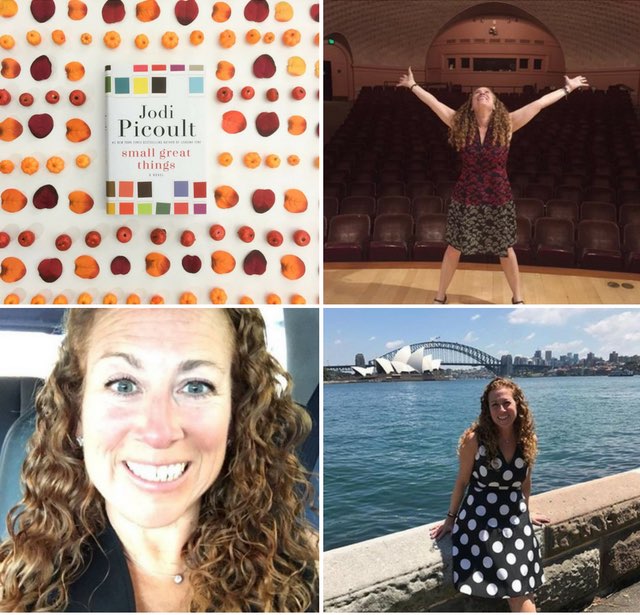
A huge THANK YOU to all of my Australian, US, UK, and Canadian fans who come out to my Small Great Things tour!
xoxo —Jodi
The miracle happened on West Seventy-fourth Street, in the home where Mama worked. It was a big brownstone encircled by a wrought-iron fence, and overlooking either side of the ornate door were gargoyles, their granite faces carved from my nightmares. They terrified me, so I didn’t mind the fact that we always entered through the less-impressive side door, whose keys Mama kept on a ribbon in her purse.
Mama had been working for Sam Hallowell and his family since before my sister and I were born. You may not have recognized his name, but you would have known him the minute he said hello. He had been the unmistakable voice in the mid-1960s who announced before every show: The following program is brought to you in living color on NBC! In 1976, when the miracle happened, he was the network’s head of programming. The doorbell beneath those gargoyles was the famously pitched three-note chime everyone associates with NBC. Sometimes, when I came to work with my mother, I’d sneak outside and push the button and hum along.
The reason we were with Mama that day was because it was a snow day. School was canceled, but we were too little to stay alone in our apartment while Mama went to work—which she did, through snow and sleet and probably also earthquakes and Armageddon. She muttered, stuffing us into our snowsuits and boots, that it didn’t matter if she had to cross a blizzard to do it, but God forbid Ms. Mina had to spread the peanut butter on her own sandwich bread. In fact the only time I remember Mama taking time off work was twenty-five years later, when she had a double hip replacement, generously paid for by the Hallowells. She stayed home for a week, and even after that, when it didn’t quite heal right and she insisted on returning to work, Mina found her tasks to do that kept her off her feet. But when I was little, during school vacations and bouts of fever and snow days like this one, Mama would take us with her on the B train downtown.
Mr. Hallowell was away in California that week, which happened often, and which meant that Ms. Mina and Christina needed Mama even more. So did Rachel and I, but we were better at taking care of ourselves, I suppose, than Ms. Mina was.
When we finally emerged at Seventy-second Street, the world was white. It was not just that Central Park was caught in a snow globe. The faces of the men and women shuddering through the storm to get to work looked nothing like mine, or like my cousins’ or neighbors’.
I had not been into any Manhattan homes except for the Hallowells’, so I didn’t know how extraordinary it was for one family to live, alone, in this huge building. But I remember thinking it made no sense that Rachel and I had to put our snowsuits and boots into the tiny, cramped closet in the kitchen, when there were plenty of empty hooks and open spaces in the main entry, where Christina’s and Ms. Mina’s coats were hanging. Mama tucked away her coat, too, and her lucky scarf—the soft one that smelled like her, and that Rachel and I fought to wear around our house because it felt like petting a guinea pig or a bunny under your fingers. I waited for Mama to move through the dark rooms like Tinker Bell, alighting on a switch or a handle or a knob so that the sleeping beast of a house was gradually brought to life.
“You two be quiet,” Mama told us, “and I’ll make you some of Ms. Mina’s hot chocolate.”
It was imported from Paris, and it tasted like heaven. So as Mama tied on her white apron, I took a piece of paper from a kitchen drawer and a packet of crayons I’d brought from home and silently started to sketch. I made a house as big as this one. I put a family inside: me, Mama, Rachel. I tried to draw snow, but I couldn’t. The flakes I’d made with the white crayon were invisible on the paper. The only way to see them was to tilt the paper sideways toward the chandelier light, so I could make out the shimmer where the crayon had been.
“Can we play with Christina?” Rachel asked. Christina was six, falling neatly between the ages of Rachel and me. Christina had the biggest bedroom I had ever seen and more toys than anyone I knew. When she was home and we came to work with our mother, we played school with her and her teddy bears, drank water out of real miniature china teacups, and braided the corn-silk hair of her dolls. Unless she had a friend over, in which case we stayed in the kitchen and colored.
But before Mama could answer, there was a scream so piercing and so ragged that it stabbed me in the chest. I knew it did the same to Mama, because she nearly dropped the pot of water she was carrying to the sink. “Stay here,” she said, her voice already trailing behind her as she ran upstairs.
Rachel was the first one out of her chair; she wasn’t one to follow instructions. I was drawn in her wake, a balloon tied to her wrist. My hand skimmed over the banister of the curved staircase, not touching.
Ms. Mina’s bedroom door was wide open, and she was twisting on the bed in a sinkhole of satin sheets. The round of her belly rose like a moon; the shining whites of her eyes made me think of merry-go-round horses, frozen in flight. “It’s too early, Lou,” she gasped.
“Tell that to this baby,” Mama replied. She was holding the telephone receiver. Ms. Mina held her other hand in a death grip. “You stop pushing, now,” she said. “The ambulance’ll be here any minute.”
I wondered how fast an ambulance could get here in all that snow.
“Mommy?”
It wasn’t until I heard Christina’s voice that I realized the noise had woken her up. She stood between Rachel and me. “You three, go to Miss Christina’s room,” Mama ordered, with steel in her voice. “Now.”
But we remained rooted to the spot as Mama quickly forgot about us, lost in a world made of Ms. Mina’s pain and fear, trying to be the map that she could follow out of it. I watched the cords stand out on Ms. Mina’s neck as she groaned; I saw Mama kneel on the bed between her legs and push her gown over her knees. I watched the pink lips between Ms. Mina’s legs purse and swell and part. There was the round knob of a head, a knot of shoulder, a gush of blood and fluid, and suddenly, a baby was cradled in Mama’s palms.
“Look at you,” she said, with love written over her face. “Weren’t you in a hurry to get into this world?”
Two things happened at once: the doorbell rang, and Christina started to cry. “Oh, honey,” Ms. Mina crooned, not scary anymore but still sweaty and red-faced. She held out her hand, but Christina was too terrified by what she had seen, and instead she burrowed closer to me. Rachel, ever practical, went to answer the front door. She returned with two paramedics, who swooped in and took over, so that what Mama had done for Ms. Mina became like everything else she did for the Hallowells: seamless and invisible.
The Hallowells named the baby Louis, after Mama. He was fine, even though he was almost a full month early, a casualty of the barometric pressure dropping with the storm, which caused a PROM—a premature rupture of membranes. Of course, I didn’t know that back then. I only knew that on a snowy day in Manhattan I had seen the very start of someone. I’d been with that baby before anyone or anything in this world had a chance to disappoint him.
The experience of watching Louis being born affected us all differently. Christina had her baby via surrogate. Rachel had five. Me, I became a labor and delivery nurse.
When I tell people this story, they assume the miracle I am referring to during that long-ago blizzard was the birth of a baby. True, that was astonishing. But that day I witnessed a greater wonder. As Christina held my hand and Ms. Mina held Mama’s, there was a moment—one heartbeat, one breath—where all the differences in schooling and money and skin color evaporated like mirages in a desert. Where everyone was equal, and it was just one woman, helping another.
That miracle, I’ve spent thirty-nine years waiting to see again.